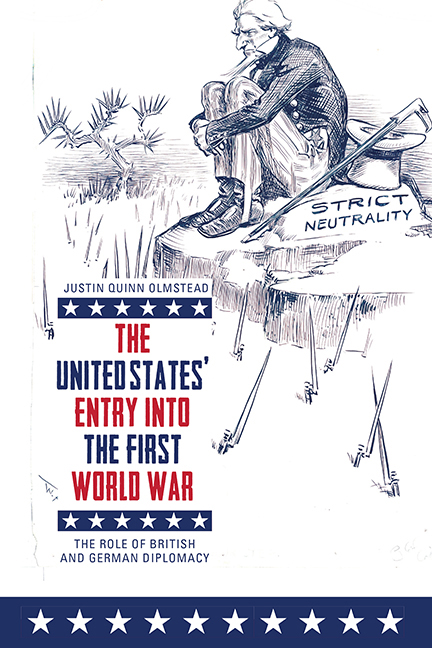Book contents
2 - The United States and Britain's Blockade
Published online by Cambridge University Press: 12 October 2019
Summary
H. C. Allen points out that since 1776, when Adam Smith published his masterpiece, The Wealth of Nations, the majority of world trade has been maritime trade. For the newly formed American nation, this marine trade was no less essential to its well-being than it was for the Europeanbased empires, and by 1812 the United States was at war with Britain. This second war for independence was ostensibly due to British violations of maritime law during its war against Napoleonic France. In 1914, as Britain set the Royal Navy to its wartime task of strangling German commerce, and with it Germany's ability to wage a successful war, British policy once again came into conflict with American interests. Had it not been for the diplomatic actions of Foreign Secretary Sir Edward Grey, American insistence on freedom of the seas could have seriously harmed Anglo-American relations, and – more germane to the issues of August 1914 – it could have wrecked the British war effort.
Understanding why the United States dropped its objections to the rules by which Britain had chosen to prosecute the war is directly related to the extent of the influence Britain had over America. By the time Grey first took office in 1905, the promotion of friendship between the United States and Britain had become a staple of British foreign policy. Under Grey's direction, the British Foreign Office had gone from just promoting friendship to influencing US foreign policy decisions to support British interests.
By September 1914 British influence had reached, as historian Ray Stannard Baker correctly characterized, ‘the point of domination – over American diplomacy’. Though domination does not guarantee victory, Britain wielded this diplomatic power as yet another tool in its arsenal throughout the Great War. It was Foreign Secretary Grey's understanding of this power of persuasion, his deftness at timing, and his understanding of America's tendencies in diplomatic matters that led him successfully to assure US acquiescence in British naval strategy. As Britain began to turn the screws on Germany's commerce – using the Royal Navy to seize ships carrying both licit and illicit goods to European ports – the US Secretary of State William Jennings Bryan was appealing to all warring nations to abide by the Declaration of London of 1909.
- Type
- Chapter
- Information
- The United States' Entry into the First World WarThe Role of British and German Diplomacy, pp. 40 - 65Publisher: Boydell & BrewerPrint publication year: 2018



